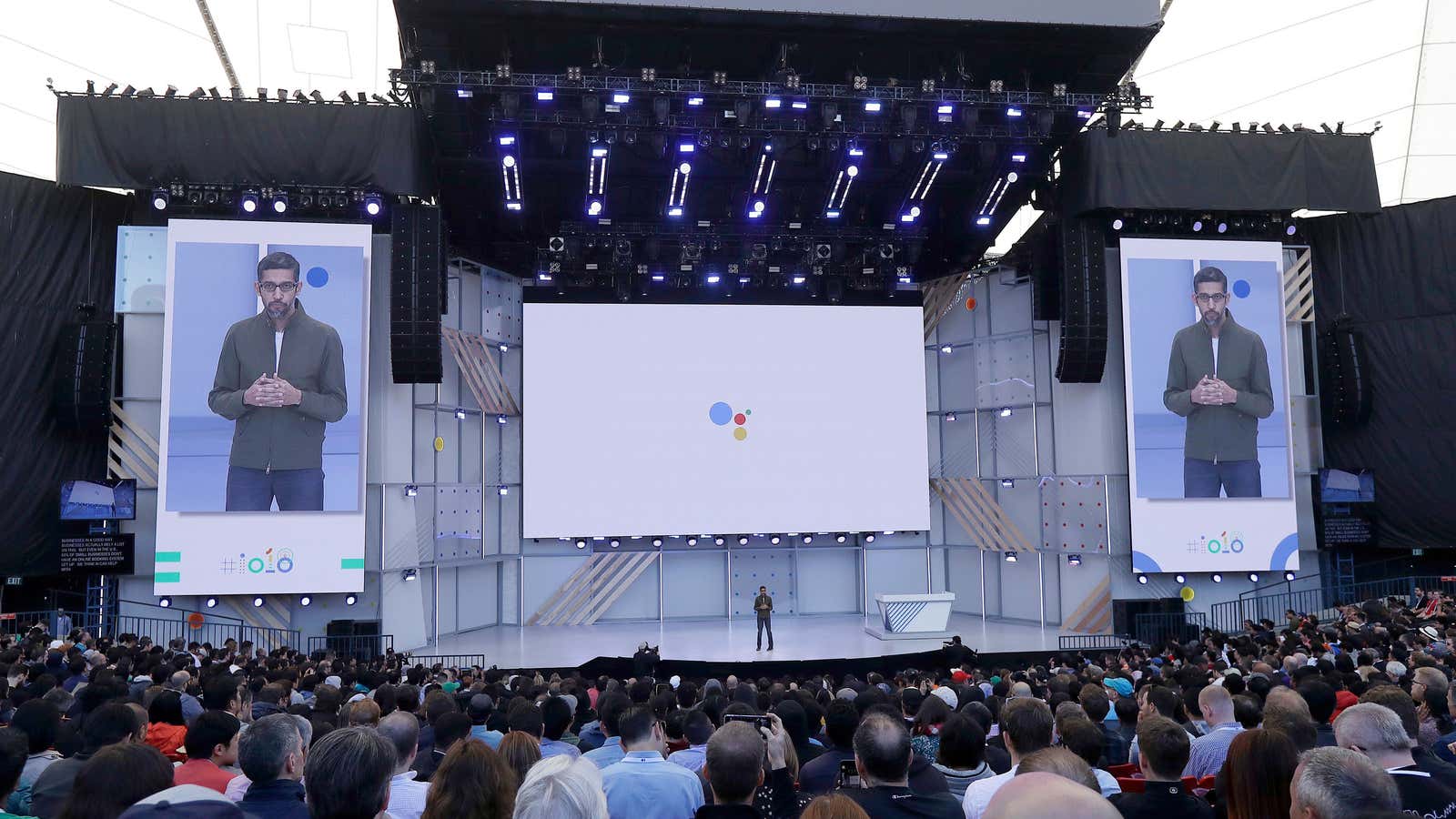Google’s annual conference for developers, called Google I/O, has historically been all about the tech: the bigger, the faster, and more eye-popping the better. In 2015, the company launched a virtual reality headset and an enhanced Android smartphone operating system. The next two years it shifted the focus to the integration of Google devices into homes and the arrival of artificial intelligence. And as the 2019 conference begins today (May 7), it’s likely to hit a different note.
It became clear last year that Google was no longer just speaking to its fans and developers at Google I/O. Instead, it was telling the world how it wants to be seen: Not as just a search engine, but as the operating system behind our lives. CEO Sundar Pichai gave the event’s keynote, describing the “deep sense of responsibility” the company has for how its technology is used. While letting others showcase Google’s latest technology, Pichai chose to announce the company’s latest “Digital Wellbeing” initiative, which encouraged its customers to use its products less.
“People are anxious to stay up to date with all the information out there,” he said. “They have FOMO: the fear of missing out. We think there’s a chance for us to be better,” citing a new acronym, “JOMO,” or the joy of missing out. “It’s clear technology can be a positive force, but it’s equally clear that we can’t just be wide-eyed at the innovations technology creates. Now the path ahead needs to be navigated carefully and deliberately, and we feel a deep sense of responsibility to get this right.”
This year, Google will face the challenge of marrying excitement about its tech—and there are plenty of new products and features to excite the developer audience—with the harms now recognized to accompany its benefits. The company is likely to announce a raft of new developments: If Google’s push to make more AI smart devices is any indication, Assistant should get a makeover and artificial intelligence (AI) may be migrating into even more devices. New home devices and Pixel phones will be on display. The Android operating systems is evolving to better power everything from watches and cars to streaming services and television.
But it will be hard for Pichai to avoid addressing growing controversies around Google’s technology. In the last two years, the search giant has weathered criticism from all sides.
Governments around the world are turning hostile toward the tech giant. Since 2017, the EU has hit it with €8.2 billion ($9.2 billion) in fines for anti-competitive practices. In Washington, tech has largely fallen out of favor (paywall). Members of both parties are eager to pass legislation (paywall) reining in the tech giants, and Trump accused Google last month of conspiring with other tech companies and the “Corrupt Media [who] are sooo on the side of the Radical Left Democrats.” California enacted its own Consumer Privacy Act last year, creating new legal rights around personal data.
The harshest attacks, meanwhile, have come from the workers themselves. Since 2017, when revelations of a series of sexual harassment incidents laid bare uneven treatment of perpetrators and victims, Google employees have been staging walkouts and internal rebellions over the company’s policies. Most notably, according to reporting by the New York Times, Andy Rubin, the creator of the Android operating system, in 2014 received $90 million in an exit package from Google after the firm investigated and confirmed an inappropriate extra-martial affair with a subordinate (Rubin called these estimates “wild exaggerations.”) Similar cases of preferential treatment for dismissed executives were reported, although Google later sent an employee email claiming none of the 48 people it had fired over the previous two years for sexual harassment received exit packages.
The revelations led to a global walkout of thousands of Google employees in dozens of Google offices. “We’ve waited for leadership to fix these problems, but have come to this conclusion: no one is going to do it for us. So we are here, standing together, protecting and supporting each other,” wrote several of the walkout organizers in an essay published in New York magazine the morning of the walkout. “We demand an end to the sexual harassment, discrimination, and the systemic racism that fuel this destructive culture. A second protest in May saw more than 1,000 Google employees leave their desks or stay home.
Despite Google making changes, such as ending forced arbitration in sexual assault or harassment claims, walkout organizers say Google has retaliated against them. “People who stand up and report discrimination, abuse, and unethical conduct are punished, sidelined, and pushed out,” wrote Claire Stapleton, a walkout organizer and marketing manager at YouTube, in a message to Google’s internal mailing lists. “Perpetrators often go unimpeded, or are even rewarded.”
A similar outcry arose over Google’s decision to build a censored search engine for China (Project Dragonfly) and military contracts, like a planned project called Maven that would have used artificial intelligence to target people in drone videos. Both inspired fierce internal resistance. Employees quit in protest, signed letters demanding Google prohibit building technology violating human rights, and refused to work (paywall) on certain projects. Both Dragonfly and Maven have been canceled (paywall) or shelved —for now.
If 2018 was the year of “Digital Wellbeing,” Google may try to make 2019 the year it redefines itself as a responsible technology company.
